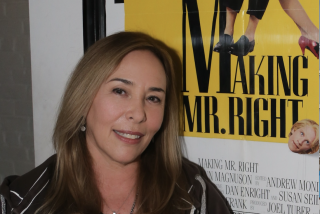Unlucky in love and life, but who cares?
- Share via
TACKLING the meaning of life is a tall order for any novel, yet Paul Mandelbaum aims to do exactly that in “Adriane on the Edge,” at least in a “Bridget Jones’s Diary,” “Sex and the City” sort of way.
Mandelbaum’s second novel is existentialist-lite, as embodied in the struggles of protagonist Adriane Gelki, a woman indeed on the edge -- of sanity, of her 30s and the millennium. Throughout this dizzyingly plotted novel, which spans four years in her life, Adriane endures a relentless cycle of crises and rescues. If her insights into her path in life seem rather superficial, well, profundity doesn’t appear to be the author’s aim.
When the story begins in 1996, foremost among Adriane’s goals is finding love. But she comes saddled with a few issues: her mother’s suicide, which provoked her to begin an unhappy affair with a married man, her boss at the Baltimore mayor’s Office of Neighborhood Enhancement. She recognizes that she seems to be “magnetized by a strong Oedipal current that flowed as well through her father’s earlier death and her long-standing resentment of her mother.” Adriane was 14 when her alcoholic father killed himself, an event preceded by his “manic streak.” Being the offspring of two people who committed suicide leaves her pessimistic about her prospects for love and the future in general.
As the episodic story progresses, Adriane finds herself caught in events that are alternately humiliating and disappointing. (Not unlike the mishaps of Bridget Jones and Carrie Bradshaw.) She is surrounded by overly familiar characters: the friends who support and cajole; a lesbian couple, one of whom she notes is “the more masculine” of the two. It’s a minor but offensive touch among the novel’s many overworked flourishes.
Even the dog Adriane rescues from the pound -- a mutt she names Barry -- is a hackneyed player in this busy drama: After their first night home together, Adriane marvels at the human-canine bond. “It occurred to Adriane that this was the first time in her twenty-eight-year-old life she had woken up next to another living creature. How pathetic! And yet she felt overcome by the pleasure of the moment -- of reposing side by side with an affectionate companion.”
When Adriane attempts some soul-searching, in the form of court-ordered therapy -- after being arrested for jokingly impersonating a prostitute -- her psychiatrist collapses and dies during their session. When she meets Luc, a suave Frenchman, he turns out to be a purveyor of porn films in which he stars. The night that Barry the dog accidentally bites off Adriane’s ear (yes, really), her best friend Joan comes out to her as a lesbian -- a word Joan dislikes because it’s “lazy and full of assumptions about personal things. About what’s going on in my heart.” Even lazier are lines of dialogue like this, stilted and vague and sounding nothing like people actually talk.
To be fair, there isn’t anything inherently wrong with the crowded genre that has come to be known as “chick lit.” It aspires to nothing more than froth and whimsy, yet at their best, such novels provide empathetic characters and wickedly dark humor. “Adriane on the Edge” offers neither, though some readers may sympathize with a protagonist being stuck in such an unimaginative, busily plotted novel. (Adriane proves resilient, if nothing else.) At least the author doesn’t give her a romantic happily-ever-after ending; her fulfillment and self-discovery come through unexpected means.
After so much bad dating, loneliness and loss, Adriane’s spiritual quest leads her eventually to India, the part of the novel that is most poignant and authentically rendered. Had the preceding sections proved as compelling, this might have been a decent light read. Instead, “Adriane on the Edge,” with its hectic, implausible story line and forced sense of wackiness, falls dead flat.
Carmela Ciuraru, a regular contributor to Book Review, is the editor of six anthologies of poetry, including “Beat Poets” and “Solitude.”
More to Read
Sign up for our Book Club newsletter
Get the latest news, events and more from the Los Angeles Times Book Club, and help us get L.A. reading and talking.
You may occasionally receive promotional content from the Los Angeles Times.










